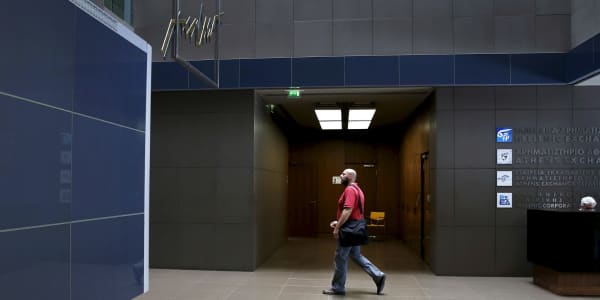Europe has undergone huge changes over the last 50 years. The end of the Cold War, the expansion of the European Union from the original six to the current 28, and the introduction of a single currency have all helped turn the region into a global economic powerhouse rich in culture and diversity.
After the Conservative party's victory in the U.K. general election, and with several other European votes scheduled over the next few years, CNBC takes a look at some of Europe's most flamboyant, iconic and influential political leaders – past and present – to assess their impact on Europe and the world.
Do you agree with our choice? Nominate the leader who you think helped shape Europe on Twitter by using the hashtag #cnbcleaders.
Adolfo Suarez:
Spanish Prime Minister, 1976-81
The death of fascist leader Francisco Franco in 1975 after nearly 40 years in power heralded an uncertain and potentially bloody future for Spain.
However, Franco's chosen successor, Spanish King Juan Carlos I, opted to scrap the ultra-conservative dictatorship and appoint Adolfo Suarez (pictured right, with King Juan Carlos) – previously a member of the Francoist regime – to lead the country's transition from dictatorship to democracy.
In 1977, Suarez oversaw Spain's first democratic election in more than 30 years. He went on to win the election and continued to rule until 1981.
During Suarez' time in office, a constitution was introduced and political parties – including the Communist Party that had been crushed by Franco – were legalized.
Suarez was known for his charm and dark good looks as well as his democratizing zeal.
A host of tributes were paid to Suarez after his death last year. King Juan Carlos described him as an, "example to us all, and proof that the Spanish are capable of overcoming the greatest difficulties and creating, by working together, the best future for all of us."
Margaret Thatcher:
U.K. Prime Minister, 1979-1990
Margaret Thatcher attained worldwide fame as the U.K.'s first and, to date, only female Prime Minister, as well as one of its longest-serving. The "Iron Lady" was also the first female leader of a Western country.
Thatcher's leadership revolutionized the Conservative Party, as well as the U.K. economy, but her time in office polarized opinion. She oversaw the privatization of state-owned stalwarts such as British Gas and British Telecom, deregulated financial markets and broke some of the country's most powerful trade unions.
Average GDP per head at current market prices rose to £10,756 from £3,686 during Thatcher's reign, according to official statistics.
On the downside, unemployment rate rose to 7.1 percent from 5.4 percent in the same period and some mining and industrial communities have never recovered from her policies.
François Mitterrand:
French President, 1981-1995
Mitterand, who died in 1996, remains France's longest-serving President. He was elected to office in 1981 as the country's first socialist head of state in more than 30 years.
During Mitterand's time in office, French unemployment rose to 9.6 percent in the last quarter of 1995 from 6.4 percent in the final quarter of 1981, according to the French National Institute of Statistics and Economic Studies.
Per capita GDP at current prices, however, increased to $27,013 in 1995 from $11,138 in 1981, according to the United Nations Statistics Division.
Helmut Kohl:
German Chancellor, 1982 to 1998
Born in 1930, Helmut Kohl was a child of both the Second World War and Cold War.
Elected Chancellor of Germany in 1982, he reigned during a period of significant political and economic upheaval, not least the fall of the Berlin Wall in 1989. The subsequent reunification of West and East Germany owed much to Kohl's determination for change.
The economic realities of reunification were tough, however, with East Germany struggling to catch up after 40 years as a Soviet satellite state.
When Kohl left office in 1998, the unemployment rate in the New Lander – federal states in the former East Germany – was 17.8 percent, compared to 9.2 percent in the former West Germany, according to Destatis.
Lech Wałesa:
Polish President, 1990-1995
On winning the Nobel Peace Prize in 1983, Lech Wałesa described himself as a "Polish worker from the Gdansk Shipyard" — but for many Poles, he is much more than that.
Wałesa rose to prominence as a human rights activist when he led a strike at Gdansk shipyard in 1980 and became leader of the first independent trade union in communist Poland's history.
Imprisoned by authorities in late 1981 after martial law was implemented, Wałesa was eventually released the following year.
In the dying days of the Soviet Union, Walesa was elected President of Poland and oversaw the country's move to privatization and a raft of market reforms that preceded its entrance to the European Union in 2004.
In 1990, Walesa's first year in power, GDP per capita was $1,698 and the country was gripped by hyperinflation, with consumer prices rising by 555.4 percent, according to the World Bank.
However, in the last year of Walesa's reign, 1995, GDP per capita was $3,612.20, the Polish economy grew by 7 percent and prices rose by a comparatively meager 28.1 percent, according to the World Bank.
Tony Blair:
UK Prime Minister, 1997-2007
Tony Blair swept to power with a landslide victory in the 1997 general election after his Labour Party won 418 seats.
A charismatic speaker and sophisticated political operator, unemployment under Blair fell to 5.3 percent in 2007 from 6.9 percent in 1997. Meanwhile, the economy grew, with average GDP per head at current market prices rising to £24,152 in 2007 from £15,070 in 1997, according to the U.K. Office of National Statistics.
To his supporters, Blair transformed Britain into a dynamic, forward-thinking and powerful country, but for many, his legacy is overshadowed by his decision to support the U.S. invasion of Iraq in 2003, as well as the economic slump of 2008.
Angela Merkel:
German Chancellor, 2005 - present
One of the most powerful women in the world, center-right Angela Merkel has been Chancellor of Germany since 2005.
Known as Mutti (German for "mommy") in her native country, Merkel rarely uses English for official speeches, as she was taught Russian as her main foreign language while growing up in communist East Germany.
Under her stewardship, Germany has consolidated its place as the strongest economy in Europe.
GDP is seen growing 1.6 percent in 2015 and 1.7 percent in 2016 by the International Monetary Fund. Berlin's influential Ifo Institute is still more optimistic, forecasting that that German GDP will expand by 2.1 percent this year.
Alexis Tsipras:
Greek Prime Minister, 2015 - present
Greece's youngest Prime Minister since 1865, 40-year-old Alexis Tsipras won a snap general election this year on an anti-austerity ticket.
Tsipras and his far-left Syriza party have inherited an economy in turmoil, with the country's debt at 177 percent of GDP and youth unemployment at roughly 50 percent.
The fiery leader has struck a defiant tone in his speeches, appealing to the anger and disenchantment felt by many Greeks.
He is currently attempting to renegotiate the terms of Greece's bailout program without giving into demands of international creditors for austerity-type reforms in return for loans. His intransigence has helped prolong negotiations with bailout supervisors for weeks, with little signs of success.
After winning the Greek election, Tsipras told his supporters that: "The verdict of the Greek people ends, beyond any doubt, the vicious circle of austerity in our country."




